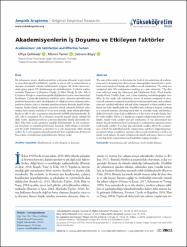| dc.contributor.author | Çelikkalp, Ülfiye | |
| dc.contributor.author | Temel, Munire | |
| dc.contributor.author | Bilgiç, Şebnem | |
| dc.date.accessioned | 2022-05-11T14:49:16Z | |
| dc.date.available | 2022-05-11T14:49:16Z | |
| dc.date.issued | 2019 | |
| dc.identifier.issn | 2146-796X | |
| dc.identifier.issn | 2146-7978 | |
| dc.identifier.uri | https://doi.org/10.2399/yod.18.031 | |
| dc.identifier.uri | https://hdl.handle.net/20.500.11776/10748 | |
| dc.description.abstract | The aim of this study is to determine the level of job satisfaction of academicians and to determine the effect of socio-demographic characteristics, workload, work-family and family-job conflicts on job satisfaction. The study was conducted with 209 academicians working at a state university. The data were collected using the Minnesota Job Satisfaction Scale, Work-Family, Family-Work Conflict Scale, and a form including sociodemographic variables. In the study, job satisfaction scores of women compared to men, research assistants compared to professors/associate professors, and academicians not satisfied with their job and salary compared to those satisfied were found out to be significantly low. Variables such as being a woman, working as a research assistant, devoting much time to scientific work, and having a child of 0-6 years of age lead to differences in the scores of work-family, family-work conflict. There is a significant negative relationship between work-family, family-work conflict and job satisfaction. It was determined that despite the job satisfaction level not being low, academicians experience more work-family conflict. It is clear that job-family conflict affects the performance of both the individual and the organization, and that a supporting organizational culture would have a positive effect on job satisfaction as well as on family-work balance. In order to balance the family and career, there is a need to develop both organizational and individual coping strategies. | en_US |
| dc.language.iso | tur | en_US |
| dc.publisher | Deomed Publ, Istanbul | en_US |
| dc.identifier.doi | 10.2399/yod.18.031 | |
| dc.rights | info:eu-repo/semantics/openAccess | en_US |
| dc.subject | Academician | en_US |
| dc.subject | job satisfaction | en_US |
| dc.subject | work-family balance | en_US |
| dc.subject | Work-Family | en_US |
| dc.subject | Conflict | en_US |
| dc.subject | Stress | en_US |
| dc.subject | Women | en_US |
| dc.subject | Men | en_US |
| dc.title | Akademisyenlerin İş Doyumu ve Etkileyen Faktörler | en_US |
| dc.title.alternative | Academicians' Job Satisfaction and Effective Factors | en_US |
| dc.type | article | en_US |
| dc.relation.ispartof | Yuksekogretim Dergisi | en_US |
| dc.department | Yüksekokullar, Sağlık Yüksekokulu, Hemşirelik Bölümü | en_US |
| dc.authorid | 0000-0002-8099-6287 | |
| dc.identifier.volume | 9 | en_US |
| dc.identifier.issue | 1 | en_US |
| dc.identifier.startpage | 59 | en_US |
| dc.identifier.endpage | 66 | en_US |
| dc.institutionauthor | Çelikkalp, Ülfiye | |
| dc.relation.publicationcategory | Makale - Uluslararası Hakemli Dergi - Kurum Öğretim Elemanı | en_US |
| dc.authorwosid | Çelikkalp, Ülfiye/ABH-2264-2021 | |
| dc.identifier.wos | WOS:000466558300007 | en_US |



















